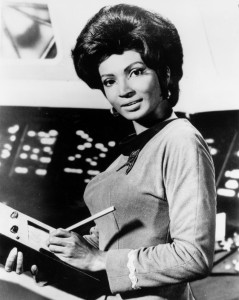Racial Representation: The Final Frontier in Science Fiction
 Nichelle Nichols as Lieutenant Uhura in 'Star Trek'
Nichelle Nichols as Lieutenant Uhura in 'Star Trek' Representation matters. Sociologists and psychologists have long known that when we see others like us in important and powerful positions, we can imagine what is possible for ourselves and model that behavior to improve our own situations. Representation is particularly important for marginalized groups—women, people of color, LGBTQ individuals, working class people, people with disabilities, and other individuals whose stories and lives are often not reflected in our media and popular culture. Certainly, we must also foster concrete policies and programs that promote economic equity, social justice, and political equality, but we should not forget to also tell these peoples’ stories as we strive for a better world.
Few producers have understood the importance of representation better than Star Trek creator and humanist Gene Roddenberry. While the original Star Trek series may seem regressive to some viewers, it’s important to note that, as Roddenberry explained in a 1991 interview with the Humanist magazine, much of the sexism and racism in the show was enforced by the network and that he actively fought against it. Star Trek was subversively progressive for its time and prioritized a diversity in casting that few television shows today bother to achieve. It also featured television’s first interracial kiss in a scene in the episode “Plato’s Stepchildren,” in which Captain Kirk (William Shatner) and Lieutenant Uhura (Nichelle Nichols) are manipulated by aliens into acting out a love scene. Though CBS was uneasy about the kiss, Roddenberry defended it in his interview with the Humanist, saying, “I never considered it a big thing…Captain Kirk and Lieutenant Uhura’s kiss was an integral part of the storyline, and it never occurred to me to question whether Kirk should kiss a black person or not.” (Never mind that throughout the course of the show Kirk had kissed numerous alien women, albeit alien women portrayed by white actresses.)
Roddenberry’s commitment to representing racial and gender diversity in Star Trek was recently affirmed by Nichelle Nichols in an interview with Oprah Winfrey on Where Are They Now? In the interview, Nichols discussed a meeting she had with Dr. Martin Luther King Jr., who was a fan of the show. A talented singer, Nichols was contemplating leaving Star Trek for Broadway until the famed civil rights leader told her how important her role on the show—as a black woman, a main character, and a bridge officer—was to the audiences watching her. “You’ve changed the face of television forever,” she recalled him telling her. King’s words had a profound impact on Nichols, who said, “I started thinking about it. It’s not about me, it’s about us.” Nichols realized that her position on Star Trek could show millions of black girls what might be possible for them, and she continued acting on the show until it was canceled in 1969.
Unfortunately, representation of black women in television and in science fiction is still seriously lacking. While a token female character or a character who is also a person of color might pop up here and there, these characters’ stories rarely take center stage and all too often they are relegated to sidekick positions, if they are even given that much attention. Some strides have been made in giving marginalized groups at least some of a voice. Star Wars: The Force Awakens, with its two protagonists being a woman and a black man, is a rare example of diversity in science fiction. Unfortunately, films and television shows with the same commitment to representation are few and far between. As a humanist, Gene Roddenberry understood that all human beings have value and all people deserve to have their stories told. He not only held this view as a personal philosophy but infused his humanist values into his television shows.
“I remember NBC said to me, ‘How many women do you have on the ship?’ They thought that we certainly couldn’t have a ship’s complement that was half men and half women,” Roddenberry recalled in the Humanist interview. “It also did not seem strange to me that I would use different races on the ship. Perhaps I received too good an education in the 1930s schools I went to, because I knew what proportion of people and races the world population consisted of.”
Science fiction, with its unlimited imagination for what humanity can achieve, is ripe for representing the diversity of the human experience, and science-fiction filmmakers, directors, and writers should emulate Roddenberry and his commitment to telling the stories of many different kinds of people.
